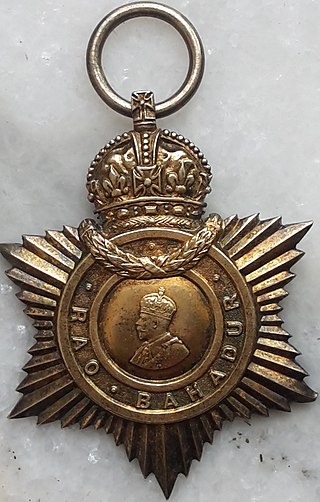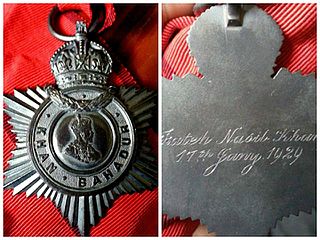Bengali Brahmos are those who adhere to Brahmoism, the philosophy of Brahmo Samaj which was founded by Raja Rammohan Roy. A recent publication describes the disproportionate influence of Brahmos on India's development post-19th Century as unparalleled in recent times.

Sir Prafulla Chandra Ray, CIE, FNI, FRASB, FIAS, FCS was an Indian chemist, educationist, historian, industrialist and philanthropist. He established the first modern Indian research school in chemistry and is regarded as the Father of Indian Chemistry.

Cooch Behar, also known as Koch Bihar, was a princely state in India during the British Raj. The state was placed under the Bengal States Agency, part of the Eastern States Agency of the Bengal Presidency. It is located south of the Himalayan kingdom of Bhutan, in present-day West Bengal.

Rai Bahadur Dinesh Chandra Sen was a Bengali writer, educationist and researcher of Bengali folklore from the Indian subcontinent. He was the founding faculty member and the Ramtanu Lahiri Research Fellow of the Department of Bengali Language and Literature of the University of Calcutta. He died in Calcutta in 1939.

Rao Bahadur and Rai Bahadur, abbreviatedR.B., was a title of honour bestowed during British rule in India to individuals for outstanding service or acts of public welfare to the Empire. From 1911, the title was accompanied by a medal called a Title Badge. Translated, Rao means "King", and Bahadur means "Brave". Bestowed mainly on Hindus, the equivalent title for Muslim and Parsi subjects was Khan Bahadur. For Sikhs it was Sardar Bahadur.

The Bardhaman Raj, also known as Burdwan Raj, was a zamindari Raja estate that flourished between 1657 and 1955 in the Indian state of West Bengal. Maharaja Sangam Rai Kapoor, a Punjabi Khatri from Kotli mahalla in Lahore, Punjab, who was the first member of the family to settle in Bardhaman, was the original founder of the house of Bardhaman, whereas his grandson Abu Rai, during whose time the zamindari started flourishing, is considered to be the patriarch of the Bardhaman Raj family.

The Imperial Legislative Council (ILC) was the legislature of British India from 1861 to 1947. It was established under the Charter Act of 1853 by providing for the addition of 6 additional members to the Governor General Council for legislative purposes. Thus, the act separated the legislative and executive functions of the council and it was this body within the Governor General's Council which came to known as the Indian/Central Legislative Council. In 1861 it was renamed as Imperial Legislative Council and the strength was increased.

Shobhabazar is a neighbourhood of North Kolkata, in Kolkata district, in the Indian state of West Bengal.

Raja Digambar Mitra (1817–1879) was an Indian businessman. He as one of the leading Derozians and first Bengali Sheriff of Kolkata.

Rai Sahib / Rao Saheb / Roy Sahib / Rao Sahib abbreviated R.S., was a title of honour issued during the era of British rule in India to individuals who performed faithful service or acts of public welfare to the nation. From 1911 the title was accompanied by a special Title Badge. Translated, Rai means "King" Sahib means "Leader". Awarded during the reign of George VI. For another image of the badge see link This was the start level title usually awarded to civilians, which could later be upgraded to Rao Bahadur and then to Dewan Bahadur titles.

The Jhargram Raj Palace is the current residence of the Malla Deb royal family. Situated in Jhargram district, West Bengal. About 14 rooms on the ground floor have been converted into a Heritage Hotel run by the family.

Nadia Raj was a dynasty of Zamindars and the rulers of territories that are now part of the Nadia district region of West Bengal, India. Their seat was at the city of Krishnanagar, Nadia. The estate of Nadia Raj was estimated to cover an area of 8,161 square kilometres (3,151 sq mi).

Tripura State, also known as Hill Tipperah, was a princely state in India during the period of the British Raj and for some two years after the departure of the British. Its rulers belonged to the Manikya dynasty and until August 1947 the state was in a subsidiary alliance, from which it was released by the Indian Independence Act 1947. The state acceded to the newly independent Indian Union on 13 August 1947, and subsequently merged into the Indian Union in October 1949.

Khan Bahadur – a compound of Khan "Leader" and Bahadur "Brave" – was a honorary title in British India conferred on Indian subjects who were adherents of Islam or Zoroastrianism. The equivalent title for Hindus, Buddhists and Indian Christians was Rao Bahadur/Rai Bahadur and Sardar Bahadur for Sikhs. The title of Khan Bahadur was one degree higher than the title of Khan Sahib.
Maharaja Jagadindra Nath Roy Bahadur (Moitra) (20 October 1868- 5 January 1925) known as the Maharaja of Natore was a noted zamindar of Natore from Bengal. He is also noted for his contribution to the game of cricket in British India.

Jhargram Raj was a zamindari which occupied a position in Bengal region of British India. The zamindari came into being during the later part of the 16th century when Man Singh of Amer was the Dewan/Subahdar of Bengal (1594–1606). Their territory was centered around present-day Jhargram district. Jhargram was never an independent territory since the chiefs of the family held it basically as the zamindars of the British Raj in India after Lord Cornwallis's Permanent Settlement of 1793. Although its owners were both rich and powerful, with the chiefs of the family holding the title of Raja, the Jhargram estate was not defined as a Princely State with freedom to decide its future course of action at the time of Indian independence in 1947. Later, the Vice-Roy of India agreed to recognize Jhargram as "Princely State" after the Second World War, but the proposal taken back as the British had decided to give independence to India.

Satyendra Nath Bosu was an Indian nationalist of the Anushilan Samiti. Bosu, while held in Alipore Jail hospital as an under-trial in the Alipore Bomb Case, shot dead the Crown witness Narendranath Goswami with the help of fellow prisoner Kanailal Dutta, leading to the collapse of the case against prime suspect Aurobindo. Bosu gave himself up on the jail premises and was subsequently put on trial. Along with Dutta, he was found guilty and executed by hanging on 21 November 1908 for the murder of Goswami.
Baikuntha Nath Sen was a Bengali scholar, lawyer and philanthropist. His grandson Amarendra Nath Sen was a judge of Supreme Court of India.

Mahesh Chandra Bhattacharya was a Bengali businessperson, dealing in Homeopathic medicines.
Ananda Chandra Roy was a Bengali politician and lawyer.















